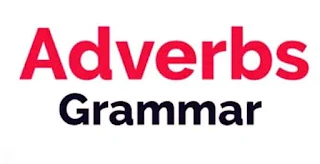Adverb: Definition, Classification, Position and Formation
What is Adverb?
The adverb is a word that modifies a verb, an adjective or other words.
Adverb that modifies the the part of speech is discussed below.
i. Adverb, modify verb: She sings sweetly.
ii. Adverb, Modify adjective: She is very honest.
iii. Adverb, Modify adverb: She sings very sweetly.
iv. Adverb, modify preposition: She is just over forty.
v. Adverb, modify Conjunction: The bell rang just after I had reached the college.
vi. Adverb, Modify Participle: This is a very interesting story.
vii. Adverb, Modify Sentence: Certainly she will come. (It is certain that she will come.)
Classification of Adverbs
👉Adverbs can be divided into three categories according to function. For example:
1. Simple Adverb
2. Interrogative Adverb
3. Relative or Conjunctive Adverb.
1. Simple adverb: An adverb that modifies a word or sentence is called a simple adverb. Simple Adverb is also called Independent Adverb.
Example:
1. The girl sings sweetly.
2. Unfortunately he failed.
Explanation: The adverb “sweetly” in the first sentence modifies only the verb “sing” and the second sentence “unfortunately” modifies “he failed” Sentence.
👉According to the meaning, Simple Adverb can be divided into the following parts:
A. Time
B. Place
C. Manner
D. Degree
E. Number
F. Order
G. Cause and effect
H. Assertion
A. Adverb of Time: The adverb which indicates the time of completion of a verb, is called adverb of time. The following words are commonly used as Adverb of Time: Today, tomorrow, yesterday, daily, always, now, then, ago, often, never, sometimes, after, already. before, when, while, early soon, immediately, formerly, presently, instantly, since etc.
Note: If the Adverb of Time asks a question “when” on the verb, the answer of a time is found. That time is Adverb of Time.
Example:
1. He will come tomorrow.
B. Adverb of Place: Here, there, everywhere, anywhere, nowhere, up, down, below, outside, inside, far, near, neither, thither, in, out, above etc.
C. Adverb of Manner: Badly, wisely, quickly, highly, silently, certainly, slowly, justly, probably, gently, hardly, well, so, thus, how etc.
Example:
i. He entered the room silently.
D. Adverb of Degree: Very, much, half, so, extremely, too, quite, how, twice, almost, fully, wholly etc.
Example:
Johnny is very wise.
E. Adverb of Number: Once, twice, secondly, thirdly, often, always, never, sometimes, again, seldom etc.
Example:
i. She helped me twice.
F. Adverb of Order: First, second, third, last, firstly, secondly, thirdly etc.
Example:
i. She came to the meeting last.
G. Adverb of Cause and Effect: Why, therefore, wherefore, hence, accordingly, consequently, as, yet, become, so etc.
Example:
i. She is sick and so she will not go to college.
H. Adverb of Assertion: Yes, no, not, surely, certainly, truly, probably, possibly, perhaps, indeed, really etc.
Example:
i. Probably it may rain today.
ii. Certainly she will come
2. Interrogative adverb: The adverb that is used to ask a question is called an interrogative adverb. For example, Why, when, where, how, many, how much etc. are used for Interrogative Adverb.
A. Time: When will you go there?
B. Place: Where does he live?
C. Number: How often does the bell ring?
D. Condition: How do you feel today?
E. Cause: Why has he done the work?
F. Quantity: How much rice do you need?
3. Conjunctive adverb: An adverb that modifies a word and joins two clauses is called a conjunctive adverb.
Example:
i. I know when he will come.
ii. Will you tell me where he lives?
iii. I know the time when he will come?
Formation of Adverbs
1. Adverb is usually formed by adding - ly to Adjective.
i. loud + ly = loudly; bad + ly = badly
ii. wise + ly = wisely; beautiful + ly = beautifully; iii. nice + ly = nicely; slow + ly = slowly.
2. If there is y at the end of the adjective and if there is a consonant before y, it will be in place of y. And at the end ly is to be added.
Happy - happily, gay - gaily, heavy - heavily, ready - readily, hardy - hardily, noisy - noisily, jolly - jollily.
3. If there is - LE at the end of the adjective, we change E rises to Y.
4. Some words are ending LY (adjective) but never use adverb. We can use other words for formation of Adverb. For example, likely (adj) - probably (adv); friendly (adj) - in a friendly way (adv).
5. Some words normally used adverb. For example, fast, hard, high, loud, late, low, little, near, best, quick, early, only, enough, better, much, back, next.
Be patient: Adding more information



